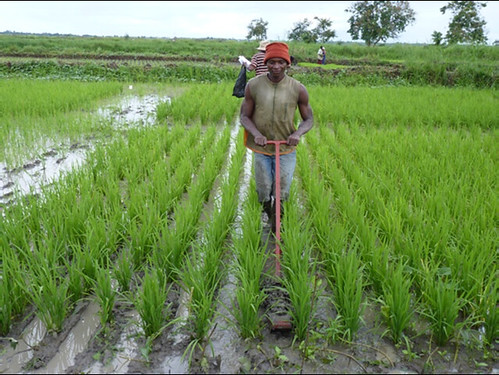Creating awareness in Tanzania on labour-saving technologies for weed control in rice

Weeds are one of the major constraints to rice production in sub-Saharan Africa. Without control, they cause yield losses ranging from 28% to 89%. One major contributing factor to these losses is the lack of knowledge and information on labour-saving weed control and management technologies among farmers and extension workers.
A jumpstart project on ‘Building local capacities in weed management for rice-based systems’ led by the Africa Rice Center (AfricaRice) sought to remedy this by creating awareness on available and appropriate labour-saving and efficient weed management practices to boost the crop’s production. It targeted research and development (R&D) partners, the private sector and farmers involved in rice-based production systems in Tanzania.
R&D professionals and students
The project conducted a one-day training at the Sokoine University of Agriculture in Morogoro, Tanzania, for 22 R&D professionals and 15 weed science students on weed control and management practices and on the use of an online interactive weed identification tool known as AFROweeds.
The workshop also aimed at enhancing networking between national and regional weed scientists by introducing the open-access online African weed science network ‘Weedsbook’. This network includes researchers from international and national research organizations, government extension officers, university lecturers and students.
‘Weed is the number one constraint in rice production in many countries in Africa and awareness on sustainable and cost-effective ways to control them in rice-based systems is low. In this project, we wanted to not only build capacity but also enhance the network of weed scientists and other people interested in weeds for easy knowledge and information sharing among each other,’ said Jonne Rodenburg, a weed scientist at AfricaRice and the research team leader.
Fabricators of mechanical weeders
The project further organized a training for blacksmiths drawn from all over the country on fabrication of rotary weeders to control weeds of lowland rice with the aim of making them widely available at competitive prices for the farmers. Currently, farmers rely on hand or hoe weeding and both are extremely time- and energy-consuming. The rotary weeders are hand-operated devices that can be easily manufactured by local blacksmiths using locally available materials. They are very popular in Asian countries but in Africa, they are only found in Madagascar.
Three new types of weeders were fabricated during the workshop and two were selected for promotion in the country after subjecting them to further on-farm testing with the farmers.
‘We wanted to build local capacities to manufacture locally adapted rotary weeders for resource-poor farmers in Tanzania. We showed the diversity of mechanical weeders and that they can be adjusted to suit local conditions or preferences of the end-user (farmer),’ Rodenburg said.
Farmer-to-farmer video

The project has also developed two farmer-to-farmer videos on labour-saving weed management technologies—the rotary-hoe weeder in lowland rice and safe and efficient use of herbicides.
‘Rotary-hoe weeders, reduce the weeding labour by between 60─65% while the herbicides reduce it by over 80%. However, farmers do not always use the herbicides correctly and this can impact negatively on their health and the environment, hence the need for the videos,’ said Rodenburg.
The videos will be translated into four languages and distributed to at least 10,000 farmers and extension workers from the rice-growing areas in sub-Saharan Africa.
Partners
Partners in this project are AfricaRice, Sokoine University of Agriculture, University of Dar es Salaam, Intermech Engineering Ltd, NAFAKA (ACDI-VOCA project on Tanzania Staples Value Chain), Kilombero Agricultural Training and Research Institute, Mbeya Agricultural Training Institute (MATI-Igurusi), Kilimanjaro Agricultural Training Centre, Centre for Agricultural Mechanization and Rural Technology (CAMARTEC), the Ministry of Agriculture, Food Security and Cooperatives, the International Institute of Tropical Agriculture and the World Vegetable Center.
Written by Jonne Rodenburg (AfricaRice).





Latest Comments